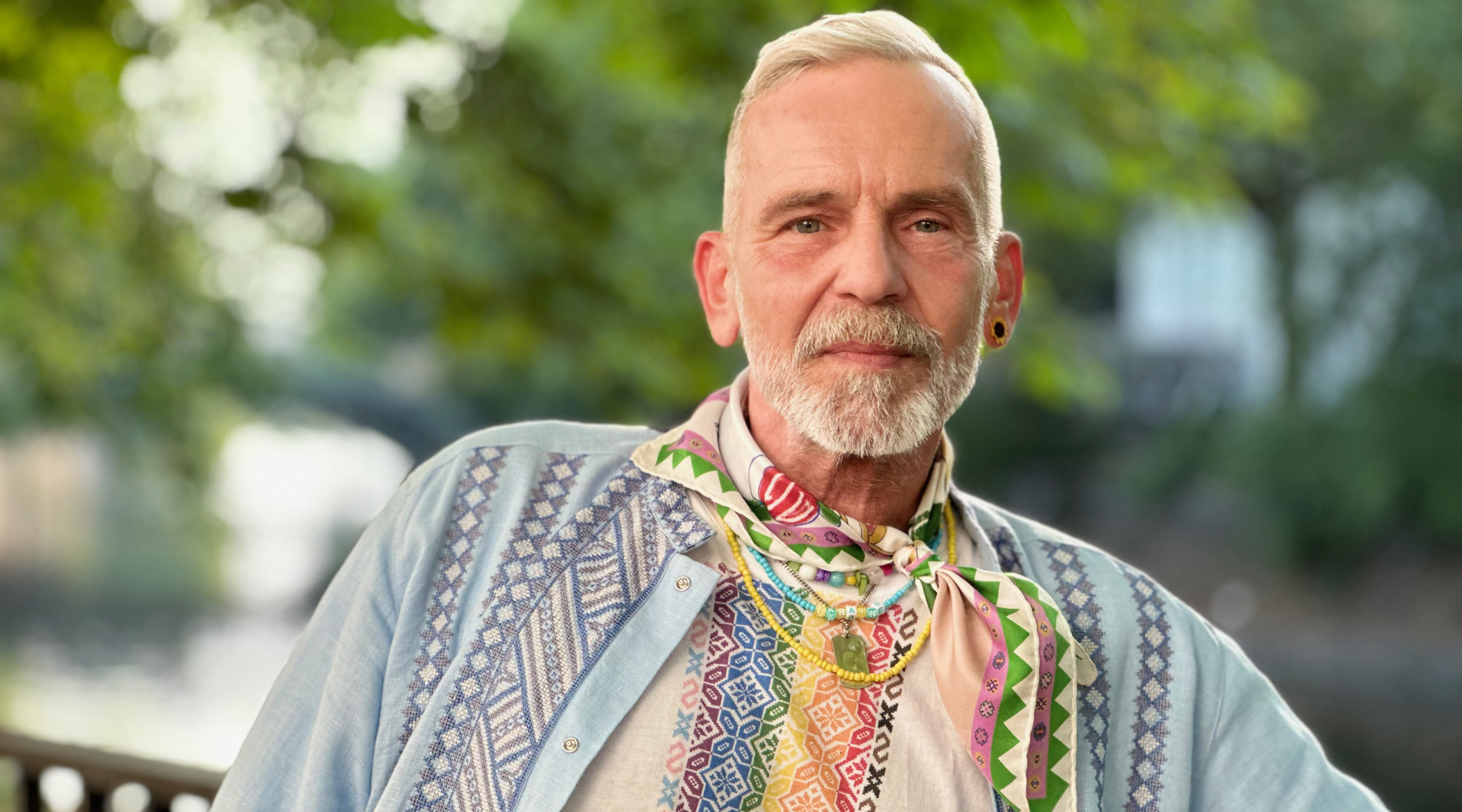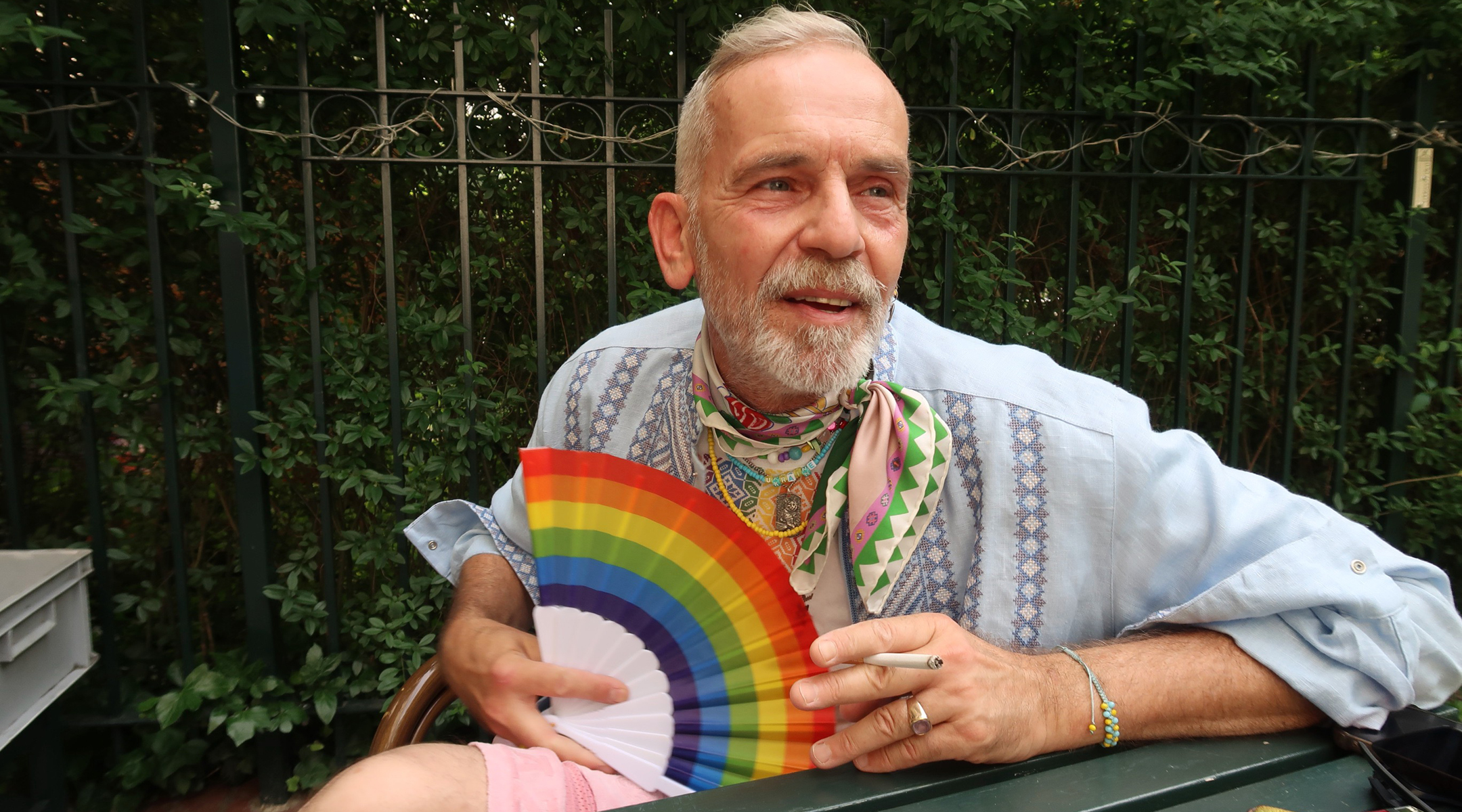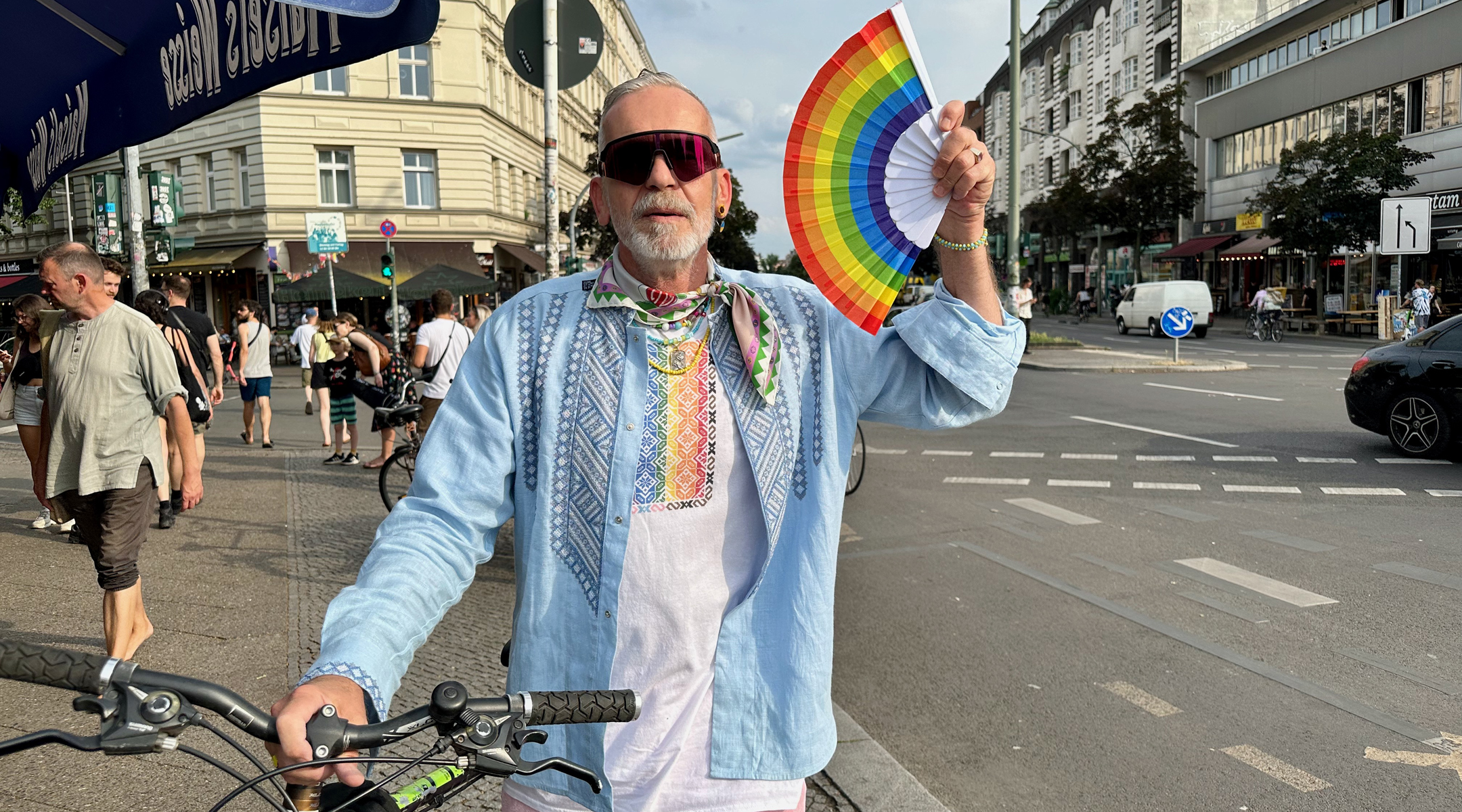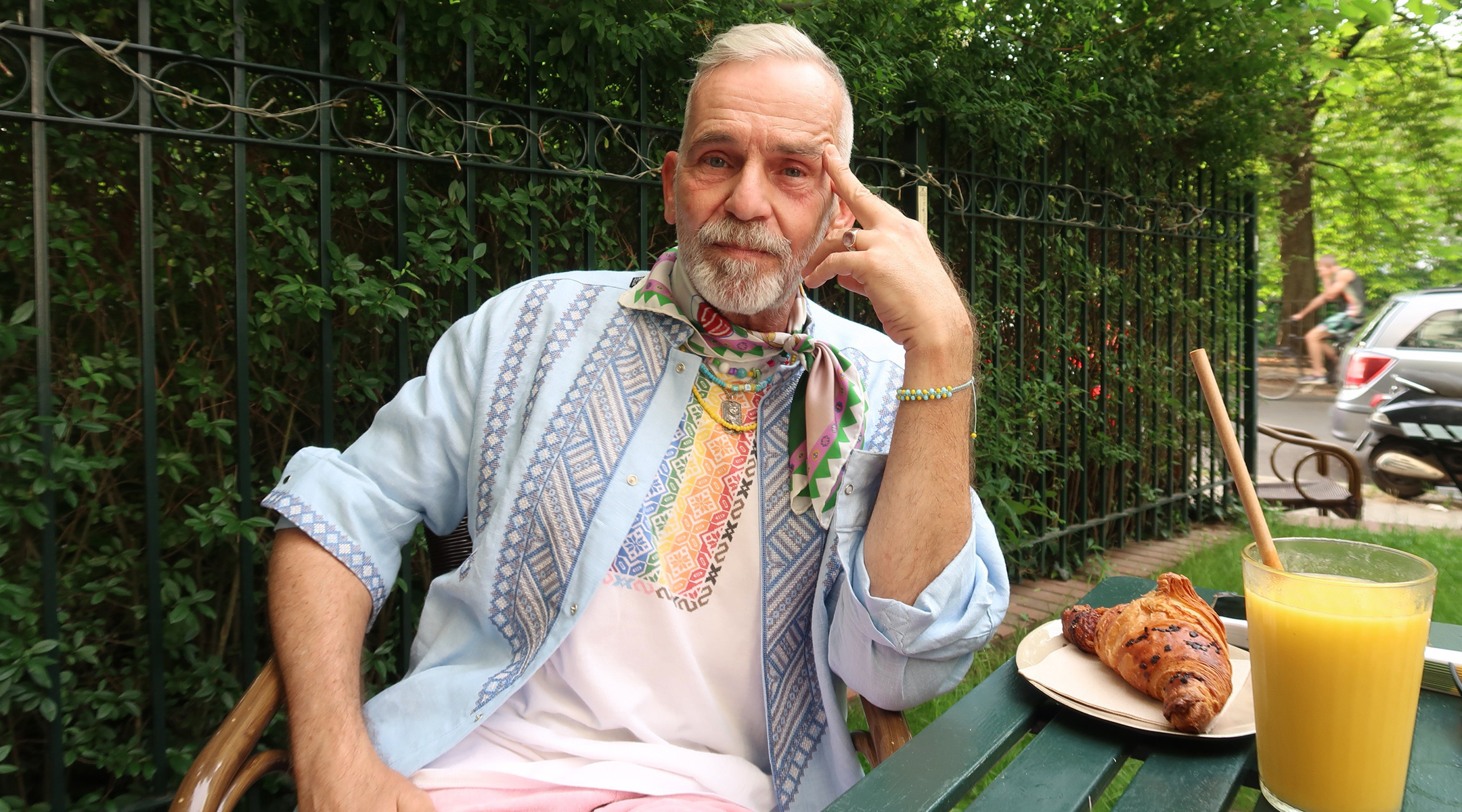For an interview with Ukrinform at one of the Berlin cafes Frank Wilde arrives on a bicycle. He is wearing a Ukrainian vyshyvanka, a t-shirt with "rainbow" motifs and the same fan, pink shorts, jewelry in yellow and blue. He proudly shows a tattoo on his arm - a raccoon, which he calls "a symbol of his relationship with beautiful brave Ukraine".
Frank challenges with the looks of his. He is not afraid that his photos look controversial and sometimes provocative. He wants to draw attention - attention to the rights of minorities, to any injustice, and for more than 16 months - to Russia's criminal war against Ukraine.
Frank can be seen at almost all Ukrainian and pro-Ukrainian events in Berlin, he does incredible work in support of Ukraine in social networks. It takes much time, but Wilde has no intention of giving up and warns everyone against "Ukraine fatigue".
- Frank, you are known among other things for you help to the refugees. When did you start with that?
- I have always been pro-refugee because I think it is the duty to support those people who don't have the privilege and luxury to live in safety.
I didn't choose where I was born but I had the luxury to be born in a safe, peaceful place, I never had to flee, I never had to leave my house, to suffer from hunger; I was never afraid for my life, for who I am and who I love, what I feel and what I know is right for me... I was born in Western Germany, thank God.
I think it's a human thing, how you see society in general. If you want to be part of a society or you choose to think only about yourself and not to care about others. I think it's important to see the big picture.
So, I think I've always been like that. I grew up in a Christian household, I am the middle one amongst three brothers and it was for us always only natural to share clothes. If we had sweets or anything, we would always share them with our friends.
- Have you developed sort of friendship with any of the Ukrainian refugees?
- With a lot of people!
A lot of people that I met in the first months of the war are those people that I meet now again but in other functions.
For example, one of my friends that I met at the beginning of the full-scale invasion is a costume designer, Margarita Shekel is her name, she's quite a renowned costume designer. She fled from Kyiv and we were working on a film, it was called “Uprooted”, for a UN refugee agency for the Refugee day of last year.
I was asked by the German service production if I knew of any assistant who could help her, and I told them to send me the script, then I phoned them up and said that I would assist her in that very interesting project myself. And they told me, “Frank, it's a charity project, there's no money”. And my reply was, “Why the fuck don't you understand why I want to assist her?” And they said, “Are you sure you want to do that?” And I said, “Of course, I want to do it, otherwise I wouldn't say that”. That's how I met Margarita, and we became friends.
I stayed in contact with her, we met a couple of times after the film was done. And when I was in Kyiv in May, she picked me up from the station because now she's working for UNITED 24.
It's kind of amazing. My whole circle of friends had a bit of shift during the full-scale invasion. Also, because my priorities changed a bit, you know.

I ALWAYS TRY TO BE HONEST
- You are the part of UNITED 24 now. When did you join the project?
- It was at the end of May or beginning of June last year.
I was asked on Instagram when my Instagram grew a bit more influential, especially amongst Ukrainian media.
A lot of Ukrainian media got interested when I gave an interview to the magazine “Village”. I think what was interesting for a lot of people is that I was honest. I always try to be as honest and direct as possible.
I told in that interview that my name is Frank Wilde. I'm 59 years old. I live in Berlin, I'm homosexual and I'm a costume designer. Their second question was, “Why do you support Ukraine?” And I said, “I don't even understand the question, because the question should be – “How could you not support Ukraine?”.
It's completely natural for me. It goes without a question.
Then it went on and I was featured in “Vogue Ukraine”, in “Marie Claire Ukraine” and all the government sites…
- You don’t have too many fans in Russia...
- The funny thing is the more popular I was becoming in Ukraine the more upset was Russia. And it was even than when I said nothing against Russia, long before I used the hashtag #russiaisaterroriststate. If you look at my last year's Instagram, it was kind of innocent, I used a lot of blue and yellow, I always use flowers in my Instagram because I think it's far better for everybody to communicate a positive life-embracing perspective rather than something that's threatening or evil.
A lot of people told me Ukraine is very homophobic. I thought like let's try and see. I did some really wild styles in Instagram and feedbacks were actually all positive. Even from super-macho Ukrainian soldiers in Donbas. Actually, I had long conversations with some of them and the dialogues were, I must say, always respectful, understanding and never insulting.
But Russian homophobia is really aggressive. I received homophobic, nasty comments from them.
And this is something that comes to no surprise for me. In 2013 Russia invented the homo-propaganda laws and it was not unnoticed here in Berlin, it was something where the queer community really stood up - we had two big demonstrations in Berlin in front of the Russian embassy.
I think it's indicative of fascist systems, you know, when you pick a minority put the blame on it, ridicule them, insult them, discriminate them to distract from other problems you have in society and to make one part of society be against others.
I'm German, I know about the history, the painful history of my own country, you know, and a bit about how things work. And it was, for me, a clear warning sign.

THE LEVEL OF CRUELTY OF THE "RUSSKIY MIR" IS HARD TO STAND
- When did you start to realize what “Russkiy Mir” really is? Was it after the full-scale war started or earlier?
- I think I really understood it, like probably a lot of Europeans, when Putin said a few days before the full-scale invasion to French President Macron and German Chancellor Scholz that he was not going to invade, that they were doing exercise, and then on the early morning of February 24 they were bombing the whole Ukraine all at once. And we all knew from that moment on, it was a huge lie.
I was pretty sure it was going to happen before because I would have never trusted Putin. We saw what he did with Georgia in 2008. We saw the annexation of Crimea and then this “referendum” after his soldiers threatened the people to vote. And how they removed all the people from Crimea and exchanged them with Russians. We have the same situation now with the kidnapping of the children, which is for me one of the most disgusting things.
None of it surprises me, but the level of cruelty is sometimes hard to bear.
- Don't you think that too many people in Germany still do believe in some «beautiful Russia», «mysterious Russian soul»? Politicians as well, not only just ordinary people...
- It all has built up very long.
Everybody, of course, was happy after the World War II ended, also that the Cold War was over with the falling of the (Berlin) Wall. In an ideal world Russia would be friends with Germany, with France, we all would be friends. But this, as we see now, is a kind of fairytale. And it's very, very hard for some people to get rid of the illusions. And especially since the Russian propaganda is pretty strong and very influential.
Take, for example, the deputy of the Bundestag representing the party which got 4.9% of votes (the Left party) Sahra Wagenknecht. She appears once a week in talk-shows in Germany telling her complete bullshit, her total Putin propaganda. And she's just throwing in fairy tales and stuff that's actually not true. Think about the “Manifest for peace” they organized for 25th of February this year. It looked more like a “Manifest for oppression” actually. It says, “Let's not send weapons to Ukraine, there has to be peace talks”. I can't imagine that she's really that stupid, that she doesn't know what it means. It just means there will be no Ukraine anymore.
Wagenknecht was asked in the talk-show how many Ukrainians she knows? And she said, “None, I don't know anybody, but I get emails from them”. – “Have you ever been to Ukraine?” – “No, but I don't have to”... It tells you everything about her position. And still she's listened to. She's very, very good rhetoric-wise. But I must also say Goebbels was also very good rhetoric-wise.
I know some people will hate to hear that, but, you know, the thing with having a good rhetoric is a very dangerous weapon. And Wagenknecht is using it very wisely to promote her ideas. She's paid by our tax money. She's never in Bundestag, she's earning money with going to every talk-show, putting her face in for Putin propaganda.
I can't say I hate her, but I think it's a problem of media also in Germany.
I have so many personal contacts to people in Ukraine. This makes such a difference when you actually know the stories of people. And when you see somebody talking bullshit on television you think, “How can you do that!?” I know personally 600 or 700 Ukrainians, none of them wants to live under a Russian government. None. Not a single person.

WITH SUCH AN AGGRESSOR AS PUTIN, PEACE IS NOT POSSIBLE
- What would you say to those in Germany who urges to stop the war right now?
- Well, the only way to stop the war is that Russia removes its troops from Ukraine. If Russia just goes from Ukraine, there will be peace. It's that simple. It's not like two states fighting against each other, it's Russia fighting on Ukrainian soil.
Just take your things, go back home and there will be peace.
I don't know what's so hard to understand about that.
- You make that Elevator-series in the Instagram. When did you start with that and what it is about? And why in the elevator, by the way?
- It's like a war diary, it's one photo per day. Every day of the war.
I make photos in the elevator for a long time, for 12 years already. I take a picture because I'm a very visual person, I'm a fashion designer, wardrobe stylist. So, for me, visuals are the message.
With time I started using it also for political things - for gay rights, for queer people, but also solidarity for refugees, for women's rights, against Brexit, for taking care of the earth, etc.
It's always a very personal thing and I like doing it like this because the elevator is a repetitive small space, it's locked off, in some way it's a safe space. And while it's a small elevator, you can put things up and without saying a word, without an explanation, you can make yourself understood without the language barrier. You know, people understand my pictures when they live in India, in America, when they live in Ukraine. Because you don't need language for that. You understand what it's about, you can transport emotions and political sayings with it.
- In one of the recent photos you pose with an old friend of yours, a knitted racoon, Racoony as you call it. This time it was an appeal for project “Help pets”. Say a few words about that.
- That one was actually for the “UA animals”, after Kakhovka dam tragedy.
I indeed write little stories around Racoony because it’s easier for people to understand the whole tragedy of the war when it’s told through a pet s view. My story goes that s he's from Kherson and is a refugee who stays with me until he can return safely to his beloved home.
This ecocide is a huge threat not only to Ukraine and not only to the countries around Black Sea. It turns a lot of Ukrainian soil into a desert.
It's a huge catastrophe. And it doesn't get that attention that it should. Because people are tired of the war.
At the beginning of the war we had a huge solidarity, everybody had a Ukrainian flag in the window and there was “We stand with Ukraine” and so on. But, you know, it has gone down but the war didn't stop.
- What would you say to those people who are talking about German fatigue, Europa fatigue and feeling that fatigue?
- I would say, “Be aware of what you have and be aware of what is in danger. You have to know that you're not just supporting other people and helping others, by the end of the day you actually are supporting your own future. You're supporting yourself. You're supporting your children in the way they grow up. And it's a very good investment in this. And you do something that other people benefit from. And in the long run, you benefit from it as well”.
Anyone who thinks that it should be good to start peace talks at this point of time is very wrong. Anyone who is now calling for peace with Putin is overlooking the fact that Putin bombs Ukraine every day, attacks civilians. And they overlook the fact that you can't create peace with an aggressor like Putin. Not at this point.
Ukraine must be armed with everything we have. Ukraine must be armed in such a way that it pushes Russia back behind the borders of Crimea. Then peace will come. There will be no peace without freedom.

UKRAINIANS KNOW EXACTLY WHAT THEY ARE FIGHTING FOR
- Is this, in your opinion, Putin's war or Russia's war against Ukraine?
- Yeah, it's Putin's Russia. But then again, it's Russia's Putin.
I mean, we all know it's not easy to protest in an oppressive system where you can get arrested just for standing without even a shield in your hand.
On the other hand, half a million young men managed to escape Russia when there was a “partial mobilization”, claiming that they were for peace. If those people would have stood up in Russia, demonstrated against the fascist system, I swear there wouldn't be a war. And now that they escaped and live in free countries where are their demonstrations? Where's their solidarity with Ukraine? Where is the rising, now that they can afford it, against the fascist system? It just doesn't exist.
There's a lot of Russians I really love. And not every Russian is for the war. I know that personally. But the thing is, the systems don't change themselves. You have to do something for it, you have to put yourself at risk.
I mean, the people in Ukraine fought on Maidan for the world they want to live in. I have a huge respect for that, for the Orange Revolution, for the Revolution of Dignity. They knew what they were fighting for and they know exactly what they're fighting for right now, and they pay a bloody high price for it. This is why I can't tolerate cowardness. I just can't.
- How many times have you been to Ukraine?
- I’ve only been two times in Kyiv.
One time about 10 or 15 years ago, on business, for only a few days.
And I've been to Kyiv for the one-year anniversary summit of UNITED 24. I was there only for a day, 15 hours, arriving in the early morning and leaving at night.
I travelled with a train of beautiful, amazing Ukrainian railways (Ukrzaliznitsa). I can't put in words how much I love Ukrainian railway, really, I think I'm the biggest fan of them. I think they're so gorgeous how they keep their staff running, how they do co-operations with designers, spraying their trains and this message of unity, of love to art, of everything. By the way, I took Raccoony with me to Kyiv.
- Would you like to go to other cities of Ukraine some time?
- Of course, I want to! I want to go to every city!
I want to go all across Ukraine and actually to start with Crimea.
Olga Tanasiichuk, Berlin
